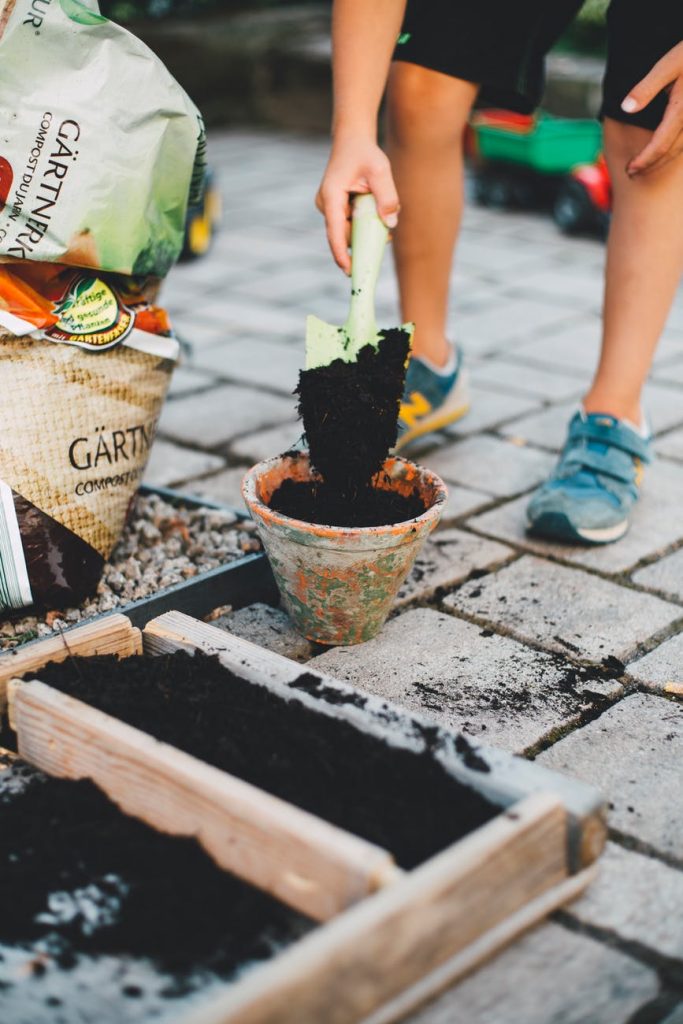An eco-friendly garden is one that is created with respect for local flora, fauna and landscape. When establishing it, you should respect and use what nature has to offer – e.g. natural terrain, water reservoirs and old trees. When creating a nature-friendly garden, also remember about animals – insects, birds and small mammals. To live in harmony with nature, it is worth considering how to care for an ecological garden in an environmentally friendly way. Besides, a lot of eco-friendly features are as easy to implement as the majority of DIY projects. Here are some proven and effective solutions.

Let bees visit your garden
Bees, bumblebees and other insects perform one of the most important functions in the world: they pollinate and thus allow fertilization of plants. Thanks to their arduous work, our crops develop and the number of plants constituting food for many animals increases. In many places around the world, there are losses in bee families. The reasons are, among others, a load of chemicals in agriculture and the use of antibiotics in beekeeping.
You can help bees, increasing their chance of survival. Building pond fountains attract thirsty pollinating insects, but also birds to our garden. Multi-hectare monocultures have reduced plant diversity and are a poor source of food for bees. Avoid cutting the grass before the summer solstice. This way, a natural, beautiful meadow will be created in your garden. You can sow white clover here – a fantastic honey plant that blooms long and gives a lot of nectar and pollen. Pollinating insects serve us for free every day, which is why we, humans, should care for them in the best way we can.
Your own grocery store
There should also be a place in the ecological backyard garden for growing vegetables necessary in the kitchen. A home garden is the best solution for those who want to plant cucumbers, tomatoes, pumpkins or parsley on their own. It’s great to have these vegetables on hand and know that they’ve grown without artificial boosters. Determining the location of beds should be dictated by practical considerations – the width of the paths must allow free access to each bed. It is also important that the paths are well hardened – for this, you should use stones, gravel or ecological grates. Vegetables from your garden are going to be perfect as ingredients for fresh summer salads, as well as useful pickled veggies in winter.
Why composting is a good idea
Ecology in the garden and at home also means proper and consistent waste segregation. All leftovers from the kitchen (bio-waste) can be successfully placed in a specially built composter. Thanks to this, you will use natural waste again and gain valuable fertilizer for your plants. Compost is an excellent organic fertilizer that you can have almost for free. Making it from home and garden waste is very easy. In nature, the nutrients contained in the soil come from plant and animal remains. As a result of long-term and accurate decomposition with the participation of microorganisms, they transform into substances that are available for plants. In the garden, unfortunately, this process doesn’t occur, because we collect fruit, rake leaves, mow the grass, not allowing organic matter to return to the soil. The composting process can take place in open wooden composters or closed ones usually made of plastic. Compost should be placed on the sidelines of the garden, in a slightly shaded area, sheltered from the wind.
Save water!
The natural availability of water is still decreasing, and its prices are rising. It is worth considering how you can use water that falls from the sky anyway. Rainwater is the cheapest source of water, so it is worth obtaining it from roofs, balconies and terraces and using it for irrigation of plants or various cleaning works. Rainwater is also the only renewable source of water. However, adequately recovered and collected can significantly reduce the daily consumption of drinking water and thus reduce the cost of purchasing it.
The only reasonable solution is to collect it. Gather water flowing out of the gutters in a barrel or spread it around the garden, preferably under trees and bushes. It is worth digging deep pits near them, covering them with peat and covering with soil. They will act as a moisture reservoir. The use of water from precipitation is both ecological and economical. At the same time, it helps reduce the cost of maintaining a household. The rainwater collection system can be underground or above ground. Catching rainwater requires specialized equipment. Underground boxes are designed in a way to accumulate as much water as possible, and then slowly distribute it in the ground.
Our excessive interference in the habits of nature is the cause of numerous problems. Sometimes even seemingly minor action can have a positive impact on the environment.
Care for the garden, being one of the best ways of physical therapy, should go hand in hand with concern for nature. Nature is not indestructible and must be protected. Changing garden strategies for more environmentally friendly benefits not only for the planet but also our pockets.



